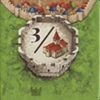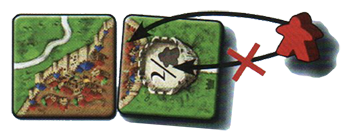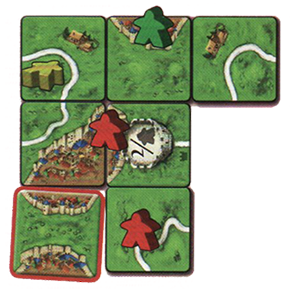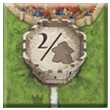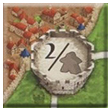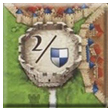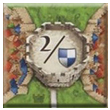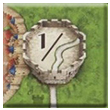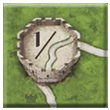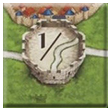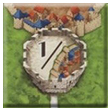The Watchtowers
General info and comments
The Watchtowers was released in 2016 by HiG through CundCo.
This mini expansion features watchtowers that you can build in and around Carcassonne. Each tower watches over different things and is more valuable the more it watches over.
This expansion has been developed for the Carcassonne basic game. All the basic game rules still apply in addition to the expansion rules below. You can combine it with other expansions - but at your own risk – that is, there will be no official rules for these combinations.
Contents
- 12 new land tiles showing watchtowers
Rules
Preparation
Shuffle the 12 land tiles showing the watchtowers together with those from the base game.
Gameplay
1. Placing a tile
When you draw a land tile showing a watchtower, place it according to the known rules.
2. Placing a meeple
After placing a land tile showing a watchtower, you may place one of your meeples on the tile according to the normal rules. You may place it on a city or a road, or in a field as a farmer. You may not place it on the watchtower itself.
3. Scoring a feature
When a completed road or a city contains a tile which features a watchtower, and there is a meeple on the feature (city, road) on that tile, the watchtower is scored first. The completed road or city is scored afterwards. [1] [2] [3] [4]
This does not apply to farmers. Farmers do not trigger scoring for watchtowers. [5]
For scoring the watchtowers, the 8 directly adjacent tiles and the tile with the watchtower itself are considered. You can see on each watchtower what scores you points:
 |
2 points for each meeple [6] [7] | |
 |
2 points for each coat of arms | |
 |
1 point for each tile showing at least one road segment [8] | |
 |
3 points for each monastery [9] | |
 |
1 point for each tile showing at least one city segment [10] |
The following examples show how watchtowers are scored:
Final scoring
Watchtowers do not provide points after the game. [11]
Tile distribution
Footnotes
For Icons explanation and licensing please visit Icons page.
- ↑
 This means watchtowers are scored independently from cities or roads, so the resulting score is not part of the feature. Therefore watchtowers score first as an event triggered by the completion of the neighboring city or road but it is actually a scoring associated to the meeple placed on the watchtower tile. Note that the meeple on the watchtower tile may belong to a player who doesn't have the majority in the feature being scored, so:
This means watchtowers are scored independently from cities or roads, so the resulting score is not part of the feature. Therefore watchtowers score first as an event triggered by the completion of the neighboring city or road but it is actually a scoring associated to the meeple placed on the watchtower tile. Note that the meeple on the watchtower tile may belong to a player who doesn't have the majority in the feature being scored, so:
- The player with the meeple on the watchtower will score their meeple first.
- The player with the majority will score the feature afterwards.
- ↑
 The rules describe the simplest case (one completed feature with one watchtower). However, if several watchtowers are triggered by the same tile placement, it is necessary to score all these watchtowers before removing any meeples from those features to be scored. This is especially important when the scoring involves watchtowers scoring points for neighboring meeples. This way, the players will avoid scorings leading to different results depending on the order the features (and their watchtowers) are scored and their meeples removed.
The rules describe the simplest case (one completed feature with one watchtower). However, if several watchtowers are triggered by the same tile placement, it is necessary to score all these watchtowers before removing any meeples from those features to be scored. This is especially important when the scoring involves watchtowers scoring points for neighboring meeples. This way, the players will avoid scorings leading to different results depending on the order the features (and their watchtowers) are scored and their meeples removed.
- ↑
 Note that several meeples may end up on the same watchtower tile when playing with phantoms, magic portals, flying machines, crop circles, wagons or the Count of Carcassonne. Also remember that watchtower tiles may have several segments connected to the same completed feature. So a completed road or city may contain a tile contributing with several segments to the same feature, each of them with zero, one or more meeples.
In these cases, since majority is not applied to this scoring bonus, each meeple on the watchtower tile contributing to the feature being scored will receive the watchtower points. These meeples may belong to the same or to different players.
Note that several meeples may end up on the same watchtower tile when playing with phantoms, magic portals, flying machines, crop circles, wagons or the Count of Carcassonne. Also remember that watchtower tiles may have several segments connected to the same completed feature. So a completed road or city may contain a tile contributing with several segments to the same feature, each of them with zero, one or more meeples.
In these cases, since majority is not applied to this scoring bonus, each meeple on the watchtower tile contributing to the feature being scored will receive the watchtower points. These meeples may belong to the same or to different players.
- ↑
 A meeple on a bridge placed on a watchtower tile can also trigger the scoring of a watchtower if the bridge is part of a road just completed.
A meeple on a bridge placed on a watchtower tile can also trigger the scoring of a watchtower if the bridge is part of a road just completed.
- ↑
 Monks placed on completed monasteries on adjacent tiles would not trigger the scoring for watchtowers either, as indicated in the rules for the Carcassonne I conversion of this expansion approved by HiG.
Monks placed on completed monasteries on adjacent tiles would not trigger the scoring for watchtowers either, as indicated in the rules for the Carcassonne I conversion of this expansion approved by HiG.
 This would be applicable to meeples on any monastic building or any other feature, other than roads or cities, completed on tiles adjacent to the watchtower. By monastic building, we mean monasteries, abbeys, shrines, German monasteries, Dutch & Belgian monasteries, Japanese buildings and Darmstadt churches.
This would be applicable to meeples on any monastic building or any other feature, other than roads or cities, completed on tiles adjacent to the watchtower. By monastic building, we mean monasteries, abbeys, shrines, German monasteries, Dutch & Belgian monasteries, Japanese buildings and Darmstadt churches.
- ↑
 This watchtower type only takes meeples into consideration, that is, normal meeples, large meeples, mayors, wagons, ringmasters, abbots and phantoms. Special figures (builders, pigs, barns and shepherds) and neutral figures (Dragon, Fairy, tower pieces, Count, bridges, Big Top, ferries, gold ingots, Mage, Witch or Gingerbread Man) are not considered.
This watchtower type only takes meeples into consideration, that is, normal meeples, large meeples, mayors, wagons, ringmasters, abbots and phantoms. Special figures (builders, pigs, barns and shepherds) and neutral figures (Dragon, Fairy, tower pieces, Count, bridges, Big Top, ferries, gold ingots, Mage, Witch or Gingerbread Man) are not considered.
- ↑
 When scoring a watchtower bonus for neighboring meeples you will also count any neighboring castle lords. This would be similar to how the big top considers castles in its vicinity. See Exp. 10 - Under the Big Top.
When scoring a watchtower bonus for neighboring meeples you will also count any neighboring castle lords. This would be similar to how the big top considers castles in its vicinity. See Exp. 10 - Under the Big Top.
- ↑
 Wooden bridges from Exp. 8 - Bridges, Castles and Bazaars should be taken into consideration for this watchtower as wooden bridges are considered the same as printed road segments.
Wooden bridges from Exp. 8 - Bridges, Castles and Bazaars should be taken into consideration for this watchtower as wooden bridges are considered the same as printed road segments.
- ↑
 This watchtower bonus will be applicable to all monastic buildings: monasteries, abbeys, shrines, German monasteries, Dutch & Belgian monasteries, Japanese buildings and Darmstadt churches. German cathedrals or gardens are not considered.
This watchtower bonus will be applicable to all monastic buildings: monasteries, abbeys, shrines, German monasteries, Dutch & Belgian monasteries, Japanese buildings and Darmstadt churches. German cathedrals or gardens are not considered.
Moreover, the position of a meeple placed on a special monastery (German monasteries, Dutch & Belgian monasteries, Japanese buildings) is also irrelevant. - ↑
 Castles are not placed on a particular tile and they are not cities but a different feature type, so this watchtower type would not consider castles for scoring.
Castles are not placed on a particular tile and they are not cities but a different feature type, so this watchtower type would not consider castles for scoring.
- ↑
 This statement, not included in the original rules, is inferred from the rules, since watchtower scoring can only be triggered by completed roads or cities.
This statement, not included in the original rules, is inferred from the rules, since watchtower scoring can only be triggered by completed roads or cities.


